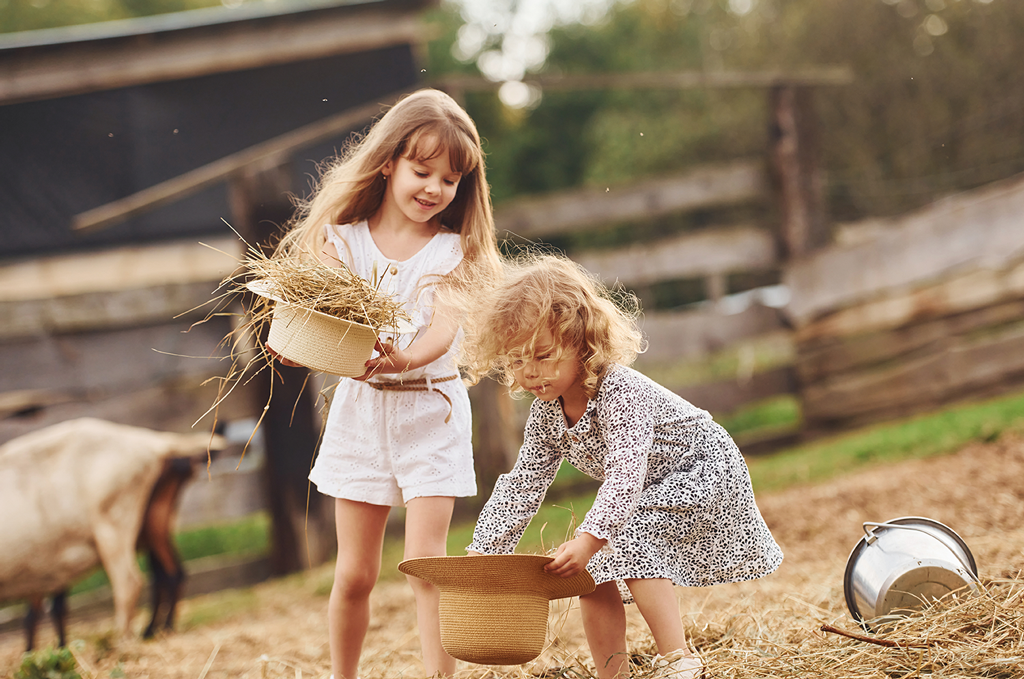
Back to their Roots: Young Iowans Return to Small-Scale Hog Farming
- foodfightadmin
- January 3, 2024
- Agriculture, GRANT
- rsc pages, rscl
- 0 Comments
Eric Boor took over his great grandfather’s nine acre farm in southern Iowa four years ago. He and his wife Mikala transformed the property and now raise pigs with their two young children, using a more environmentally sustainable and humane method than their neighbors. When they first started, many in their family and community doubted that they could successfully farm this way.
“My dad told me I couldn’t raise pigs without antibiotics because he wasn’t able to in confinement settings,” says Eric. “And then my grandpa told me I couldn’t raise them without farrowing crates. I’m doing both of those things now.”
On conventional farms, pregnant sows (female pigs that have given birth to a litter of piglets) are often placed in metal farrowing crates before giving birth. There isn’t enough room in these crates for sows to turn around or perform their natural behaviors. Several states in the United States have banned using these crates because of animal welfare concerns. As a more humane alternative, many farmers use huts and houses to shelter the sows.
“When I was looking into making my farrowing house, I told a contractor my idea and he said, ‘You sound a little crazy,’” says Eric.
The Boors are currently the only farmers in their county raising hogs outdoors, according to Eric. While this was common practice in the 1970s and 80s, hog market consolidation and high land prices mean it’s no longer financially feasible for independent farmers to raise hogs and sell on the open market, and it’s extremely rare to see hogs outside of a confinement environment, the Boors say. Many family farmers have had to leave the hog industry or find other jobs.
Eric and Mikala both knew that they could raise hogs outdoors, but it wasn’t until they started partnering with Niman Ranch that they could make it work financially and begin to grow their business.
“I couldn’t be where I’m at today without Niman,” says Eric.
Niman Ranch is a network of more than 600 small and mid size farmers and ranchers across the U.S. that uphold high standards of sustainable and humane farming practices in exchange for a guaranteed market for their product and a strong support system. As the Boors faced various obstacles starting their own farm, fellow Niman Ranch farmers and Niman Ranch’s field agent team helped to get answers or connect them with others who could.
“Niman Ranch offers a lot of resources that you wouldn’t think of,” says Mikala. “No matter what kind of question you have or issue you have, there’s always somebody there to help.”
For example, the Boors received grant funding in 2023 through the company’s philanthropic arm, the Niman Ranch Next Generation Foundation. The grant matches farmer investments in breeding stock, or gilts (female pigs that have not given birth to a litter of piglets), to expand their hog herd and provides business planning support, regular education sessions, and farmer mentorship.
Today, the Boors’ farm “looks completely different,” according to Mikala. Eric spent months refurbishing his grandfather’s various farm buildings—and putting up new ones—to house hogs and make the most of nine acres.
“I have people that come tell me all the time, some older people that raised hogs back in the 1970s the way I do, how they sure like to see them and hear them outside again,” says Eric. And according to Mikala, neighbors love to drive by and see a young family raising hogs outdoors again—a rare sight in their part of Iowa.
Eric loves working with pigs and grew up raising them outdoors with his father. While he worked in a confinement setting for a few years after high school, he always knew that for his own farm, he didn’t want to raise pigs in confinement.
“It’s completely different raising pigs outside. I see a whole different animal, in the way they act,” says Eric. “When you lock them up in hog confinement, they get aggressive. I don’t have that on our farm, I can go get into any lot with them.”
“And the meat definitely tastes better…it tastes completely different,” Mikala adds.
For Eric and Mikala, it’s important to preserve the land for the next generation. They enjoy that their children can safely run around the farm, interact with the pigs that are raised on pasture, and even help with their parents’ work.
“Our son says all the time that he wants to farm with his dad when he gets bigger,” says Mikala.
It gives Mikala hope that “we’re able to get somewhere with farming because of Niman Ranch.” As eaters become more interested in how their meat is sourced, she expects more farmers to get involved with companies like Niman Ranch and be able to nourish their families with small, sustainable farms.








